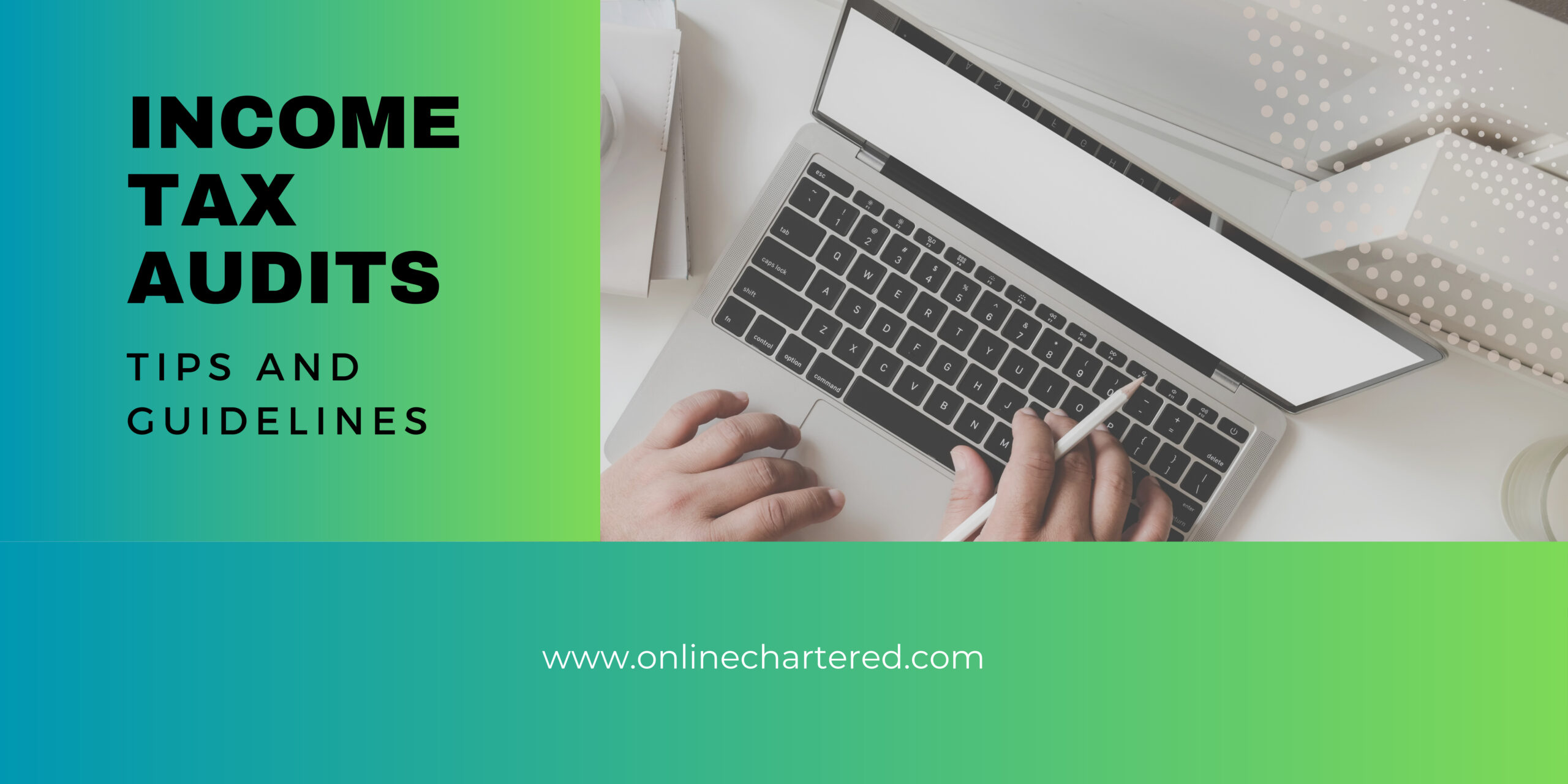Income Tax Audits: All you need to know

Introduction
Income tax audits can be a source of stress and anxiety for many individuals and businesses. The prospect of facing an audit by tax authorities can feel overwhelming, but with the right approach and preparation, you can navigate the process successfully. In this article, we will explore essential tips for preparing and responding to income tax audits, ensuring you are well-equipped to handle this situation effectively. Here is the link for hassle-free Income Tax return filing.
Understanding income tax audits
An income tax audit is a process conducted by Chartered Accountants to verify the accuracy and completeness of your tax returns. The purpose of an audit is to ensure that taxpayers are complying with tax laws and reporting their income and deductions correctly. Audits can be conducted randomly or triggered by specific red flags or discrepancies in your tax returns.
Importance of preparing and responding to audits
Proper preparation and effective response to income tax audits are crucial for several reasons. Firstly, it helps you demonstrate your compliance with tax laws and build trust with tax authorities. Secondly, it allows you to present your case accurately, potentially minimizing additional tax liabilities or penalties. By being proactive and responsive, you can increase your chances of a favorable outcome during the audit process.
Preparing for an Income Tax Audit
1. Organizing your financial records
One of the first steps in preparing for an income tax audit is organizing your financial records. Ensure that you have a systematic and well-maintained record-keeping system in place. This includes organizing your receipts, bank statements, invoices, and any other relevant financial documents. Having your records organized will make it easier to respond to the auditor’s requests and provide the necessary documentation promptly.
2. Reviewing tax returns and supporting documentation
Before the audit, carefully review your tax returns and supporting documentation for the relevant year. Ensure that the information reported is accurate and supported by appropriate documentation. This step will help you identify any discrepancies or potential issues that may arise during the audit. By proactively addressing these concerns, you can minimize the chances of further scrutiny or penalties.
3. Identifying potential red flags
Understanding potential red flags that could trigger an audit is essential. Common red flags include significant changes in income, high deduction claims, inconsistencies in reporting, and involvement in certain industries or professions that are more prone to audits. By identifying these red flags, you can anticipate potential audit triggers and take appropriate measures to mitigate any risks.
4. Seeking professional assistance is always the good step
In complex cases or if you lack confidence in handling the audit process, seeking professional assistance from a tax advisor or a chartered accountant is advisable. These professionals have experience dealing with audits and can provide expert guidance throughout the process. They can help you navigate the audit, interpret tax laws, and protect your rights.
Responding to an Income Tax Audit
1. Understanding the audit process
To respond effectively to an income tax audit, it is crucial to understand the audit process itself. Typically, audits can be conducted through correspondence, office audits, or field audits. Correspondence audits involve exchanges of letters and documents, while office and field audits may require in-person meetings with the auditor. Understanding the type of audit being conducted will help you prepare accordingly.
2. Gathering required documents
Once you receive an audit notification, promptly gather all the required documents and information requested by the auditor. This may include copies of tax returns, financial statements, receipts, invoices, and other supporting documentation. Ensure that you provide complete and accurate information to avoid further scrutiny.
3. Cooperating with the auditor
During the audit, it is essential to maintain open and transparent communication with the auditor. Cooperate fully and provide the requested information promptly. Be prepared to answer questions and provide explanations for any discrepancies or unusual items in your tax returns. Cooperation and professionalism can positively influence the auditor’s perception and facilitate a smoother audit process.
4. Presenting your case effectively
When responding to an audit, present your case in a clear and organized manner. Explain any complex transactions or deductions logically and provide supporting documentation to substantiate your claims. Maintain a professional and respectful tone throughout the process. Communicate any challenges you faced during the tax reporting process and provide any necessary clarifications.
Tips for a Successful Audit Outcome
1. Maintaining accurate records
Accurate record-keeping is vital for successful audits. Keep detailed and organized records of your income, expenses, deductions, and other relevant financial information. By maintaining accurate records, you can support the positions taken on your tax returns and provide the necessary documentation during an audit.
2. Following tax laws and regulations
Staying updated with tax laws and regulations is crucial to ensure compliance. Keep abreast of any changes in tax laws that may impact your tax reporting. Adhere to proper accounting practices and reporting guidelines when preparing your tax returns. By following the rules, you can minimize the likelihood of errors and reduce the chances of triggering an audit.
3. Timely response and communication
Timely response and effective communication are key during an income tax audit. Respond promptly to any requests or inquiries from the auditor. Keep a record of all communication and document any agreements or arrangements made during the audit process. By maintaining clear and consistent communication, you can help expedite the audit and establish a cooperative relationship with the auditor.
4. Professional representation,
In complex cases or when dealing with significant tax liabilities, it may be advisable to seek professional representation. Chartered Accountants experienced in audits can provide valuable expertise and negotiation skills. They can help you navigate the complexities of the audit process, protect your rights, and present your case effectively.
Common Issues in Income Tax Audits
1. Deduction and credit claims
Deduction and credit claims are common areas of scrutiny during income tax audits. Ensure that you have proper documentation to support any deductions or credits claimed on your tax returns. Keep records of eligible expenses and maintain documentation that proves your eligibility for specific tax benefits.
2. Underreported income
Underreporting income is a serious offense and can trigger an audit. Be diligent in reporting all sources of income, including wages, self-employment income, rental income, and investment income. Keep accurate records of income receive, investments made, tax savings schemes availed and bank statements, mediclaimes, Life insurances taken, etc.
3. Documentation discrepancies
Discrepancies between reported income and supporting documentation can raise concerns during an audit. Ensure that your documentation aligns with the income reported on your tax returns. Keep detailed records of financial transactions and be prepared to explain any discrepancies that may arise.
4. Business expenses and personal use
For business owners, the allocation of business expenses and the distinction between business and personal use can be challenging. Ensure that you separate personal and business expenses. Keep receipts and documentation for business-related expenses and be prepared to provide explanations for any expenses that may be questioned during an audit.
Easy Steps to Configure Audit Online
Conclusion
Income tax audits can be daunting, but with proper preparation and effective response strategies, you can navigate the process successfully. By organizing your financial records, understanding the audit process, and cooperating with auditors, you can present your case effectively and increase your chances of a favorable outcome. Follow best practices for tax compliance, seek professional assistance when needed, and maintain accurate records to minimize the likelihood of triggering an audit.
FAQs:
- Excessive or unsupported deductions can trigger an audit.
- Inconsistencies between reported income and third-party information can lead to an audit.
- Random selection is also a possibility for audits.
2. How does the income tax audit process work?
- The process begins with a notice from the tax authority.
- Supporting documentation is required during the audit.
3. What are the possible outcomes of an income tax audit?
- The audit can result in no changes, additional tax liability, a refund, or adjustments to your tax return.
- Criminal charges can occur in cases of fraud or tax evasion.
- Adjustments can impact your tax liability positively or negatively.
4. How should I prepare for an income tax audit?
- Organize your documentation to support your tax return.
- Review your tax return for accuracy before the audit.
- Understand the relevant tax laws and seek professional assistance if necessary.
